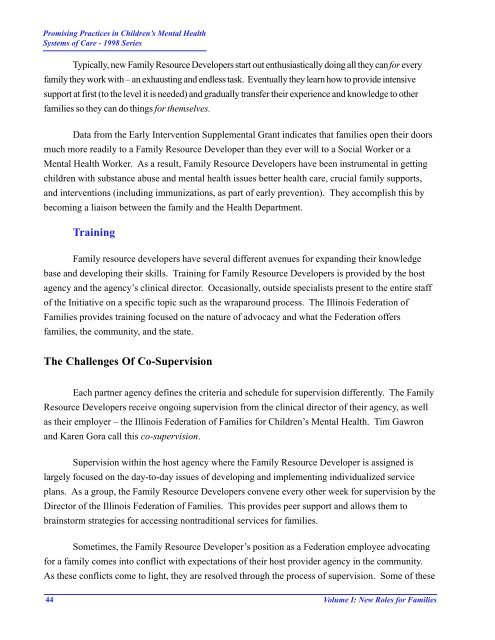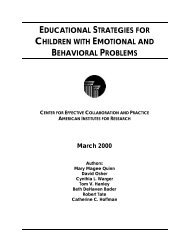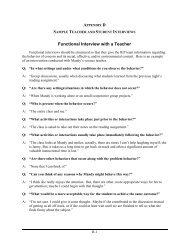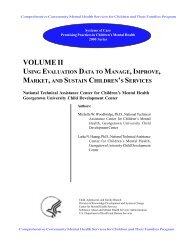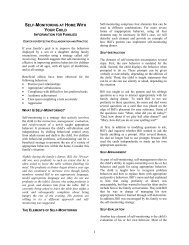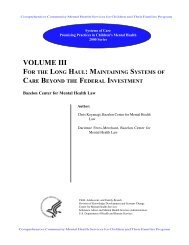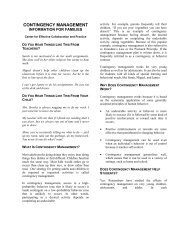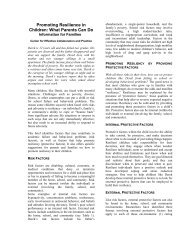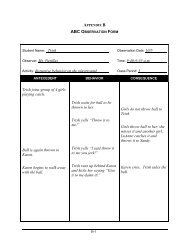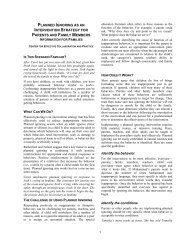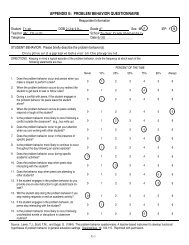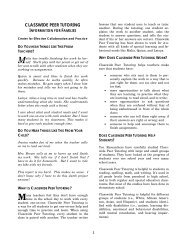VOL 1 - Center for Effective Collaboration and Practice - American ...
VOL 1 - Center for Effective Collaboration and Practice - American ...
VOL 1 - Center for Effective Collaboration and Practice - American ...
You also want an ePaper? Increase the reach of your titles
YUMPU automatically turns print PDFs into web optimized ePapers that Google loves.
Promising <strong>Practice</strong>s in Children’s Mental Health<br />
Systems of Care - 1998 Series<br />
Typically, new Family Resource Developers start out enthusiastically doing all they can <strong>for</strong> every<br />
family they work with – an exhausting <strong>and</strong> endless task. Eventually they learn how to provide intensive<br />
support at first (to the level it is needed) <strong>and</strong> gradually transfer their experience <strong>and</strong> knowledge to other<br />
families so they can do things <strong>for</strong> themselves.<br />
Data from the Early Intervention Supplemental Grant indicates that families open their doors<br />
much more readily to a Family Resource Developer than they ever will to a Social Worker or a<br />
Mental Health Worker. As a result, Family Resource Developers have been instrumental in getting<br />
children with substance abuse <strong>and</strong> mental health issues better health care, crucial family supports,<br />
<strong>and</strong> interventions (including immunizations, as part of early prevention). They accomplish this by<br />
becoming a liaison between the family <strong>and</strong> the Health Department.<br />
44<br />
Training<br />
Family resource developers have several different avenues <strong>for</strong> exp<strong>and</strong>ing their knowledge<br />
base <strong>and</strong> developing their skills. Training <strong>for</strong> Family Resource Developers is provided by the host<br />
agency <strong>and</strong> the agency’s clinical director. Occasionally, outside specialists present to the entire staff<br />
of the Initiative on a specific topic such as the wraparound process. The Illinois Federation of<br />
Families provides training focused on the nature of advocacy <strong>and</strong> what the Federation offers<br />
families, the community, <strong>and</strong> the state.<br />
The Challenges Of Co-Supervision<br />
Each partner agency defines the criteria <strong>and</strong> schedule <strong>for</strong> supervision differently. The Family<br />
Resource Developers receive ongoing supervision from the clinical director of their agency, as well<br />
as their employer – the Illinois Federation of Families <strong>for</strong> Children’s Mental Health. Tim Gawron<br />
<strong>and</strong> Karen Gora call this co-supervision.<br />
Supervision within the host agency where the Family Resource Developer is assigned is<br />
largely focused on the day-to-day issues of developing <strong>and</strong> implementing individualized service<br />
plans. As a group, the Family Resource Developers convene every other week <strong>for</strong> supervision by the<br />
Director of the Illinois Federation of Families. This provides peer support <strong>and</strong> allows them to<br />
brainstorm strategies <strong>for</strong> accessing nontraditional services <strong>for</strong> families.<br />
Sometimes, the Family Resource Developer’s position as a Federation employee advocating<br />
<strong>for</strong> a family comes into conflict with expectations of their host provider agency in the community.<br />
As these conflicts come to light, they are resolved through the process of supervision. Some of these<br />
Volume I: New Roles <strong>for</strong> Families


